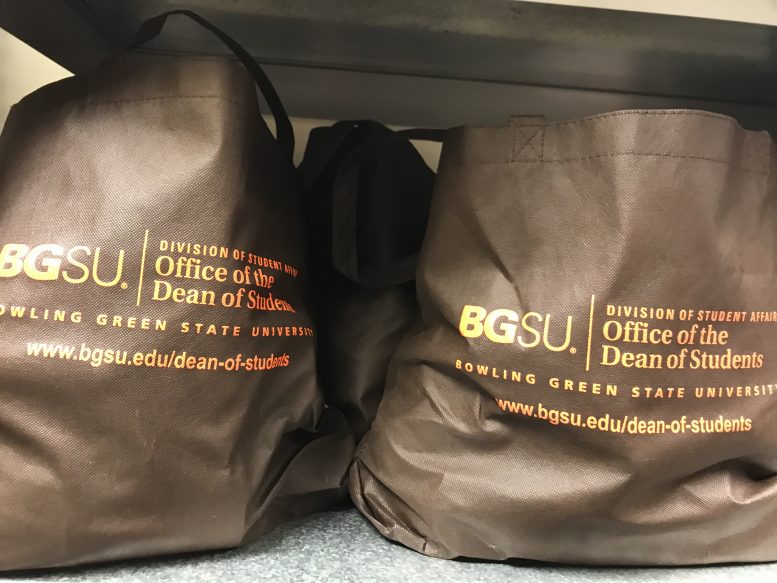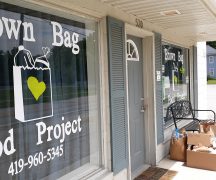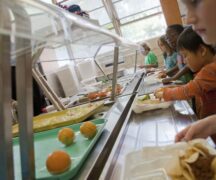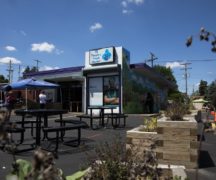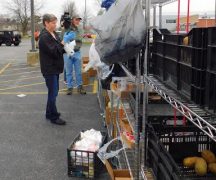By DAVID DUPONT
BG Independent News
A new center to address student food insecurity is in the works for 2022.
The Falcon Food and Resource Center will include a new food pantry, but also serve as a resource center to help students cope with other stresses, said Carrie Hamady, director of Bowling Green State University’s Undergraduate Dietetics Program. The center will be another place on campus that’s able to connect students to residence life, the counseling center, and Falcon Health to help address homelessness and other challenges many students face.
The center is now under construction in Central Hall, the former College of Business Administration. It is possible they will have a “soft” opening in spring. It’s scheduled to be fully operational in fall 2022.
Shannon Orr, political science professor, “pushed for us to get an on-campus food pantry,” Hamady said, and now it will happen.
Orr will direct the center, which will be within the College of Health and Human Services’ Center of Excellence for Health and Wellness across the Lifespan.
It will be staffed by student volunteers. Graduate students in the Master of Public Administration program and nutrition students will play the key roles in operating the center.
Having the center run by students will promote camaraderie and a welcoming atmosphere, Hamady said.
The university has hosted a monthly food pantry operated by Food for Thought. When the pandemic hit, the mobile pantry moved off campus to the nearby First United Methodist Church because of the space needed to keep it operating in a socially distanced manner.
Grab and Go bags that provide a three-day supply of food are available at Jerome Library and the Office of Residence Life.
But more was needed, Hamady said. A survey conducted before the pandemic found that about 40 percent of students indicated some issue with food insecurity.
An informal survey of about 50 respondents conducted at the November pantry found that “the majority of those folks were using food pantries in the community to meet their food needs.”
Graduate students, single parent families, veterans and international students are the ones most likely to experience food insecurity.
The problem, Hamady said, involves more than not having enough to eat. It’s about not getting enough nutritious food to eat.
“Just surviving on Ramen noodles is not healthy,” Hamady said. Society has to get past the idea of students surviving on noodles as acceptable. “Good nutrition is important,” she said.
“In order to be successful in classroom… to be able to focus, even your participation in clubs and groups, is impacted by food insecurity,” Hamady said. “To be able to have nutritious food that fuels your brain, that fuels you, is vital to your success in college and in life.”
But, she added, “we don’t just want to give people food and say: ‘Have a nice day.’ There’s more to it.”
Do they know how to prepare the food they are getting? They may have a furnished apartment with a stove, but lack the knives, can openers, mixing bowls and other implements, needed to fix meals.
“Students don’t really know how to cook properly, and they don’t know how to eat on a budget,” Hamady said. “I hear all the time how it’s expensive to eat nutritious food, but it really isn’t.”
The expectation is that they have to eat all fresh ingredients, which can be costly, she said. But frozen and canned foods are also nutritious and less expensive.
“Those are things we really want to help them with,” she said.
Paige Wagner, dietitian nutritionist with Chartwell Dining Service, runs cooking classes in the teaching kitchen. These have proved to be very popular, Hamady said.
Offering this kind of practical training broadens the range of students served by the center.
“We want to erase that stigma of food insecurity and make everybody feel very welcome. We want this to be a welcoming space where they can come ask questions,” she said.
Students may not be experiencing food insecurity, but just need help fixing healthier meals. That could include a tour of a grocery store.
Food insecurity was a serious problem before the pandemic, but COVID-19 complicated that.
Some students lost their jobs, while others in frontline jobs, found themselves under stress because they were needing to work longer hours. Some had to help their families financially because their parents lost their jobs.
Some couldn’t afford rent. Others who relied on campus computers suddenly did not have access to that technology at a time when it became even more needed as classes moved online.
The university stepped up with its emergency fund and increased its fundraising to provide the fund with additional money. Federal relief dollars were also used for the fund.
“We haven’t really seen the full results of what this pandemic has done to families and students,” Hamady said. What she’s heard from a lot of students is they are struggling with time management and trying get themselves reoriented.
“One of the things we do know is food insecurity went up nationally.”

